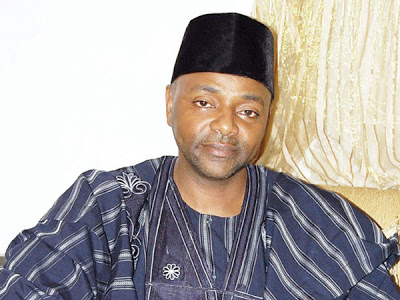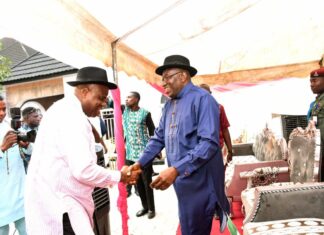Head, News Desk, VICTOR EBIMOMI, takes a look at the recent withdrawal of corruption charges against Mohammed, first son of Sani Abacha, and the concern of the country’s foreign partners as well as the implications for Nigeria’s global image rating
Muhammed Abacha
The federal government on Wednesday, June 18, dropped the corruption case against Mohammed, son of the late Head of State, General Sani Abacha.
Abacha ruled Nigeria between 1993 and 1998. Government had since February this year been in court with Mohammed on a nine-count charge of stealing public fund totalling N446.3 billion between 1995 and 1998.
In withdrawing the case, the government cited “fresh facts” that just emerged concerning the case.
The development has, however, been generating controversies across the land, as many people have protested the government’s action, claiming that it does not portray the country in good image globally, especially given its professed fight against corruption and corrupt practices.
Those who have been protesting the action, which took place at the Federal Capital Territory (FCT) High Court, Abuja, included the chairman of the Coalition Against Corrupt Leaders (CACOL), Debo Adeniran; and his compatriot in the Civil Society Network Against Corruption, Lanre Suraj.
Some notable Nigerians such as Femi Falana and Femi Aborisade also frowned at the action.
Adeniran described the government’s action as embarrassing, adding that it was “another graphic example that the present administration takes sides with corrupt elements in the society”.
He challenged the anti-graft agencies in the country to live up to their responsibilities and be bold enough to “dissociate themselves from the embarrassing intervention by the Attorney General of the Federation”.
Suraj added that the action was the most unpatriotic move by the government, and urged the people to rise and fight for the retrieval of the money.
“It is the most unpatriotic action undertaken by this government reputed for encouraging corruption and negotiating shady deals with local and international criminals who have defrauded the country. Stakeholders are therefore charged to explore available options to ensure the retrieval of the money,” he said.
Falana maintained that the withdrawal of “such grave corruption charges has serious implications for prosecuting anti-graft cases”.
Aborisade agreed that the Attorney General of the Federation (AGF), Mohammed Adoke has the power to withdraw such cases under 174(1)(c) of the 1999 Constitution. He nevertheless added that the withdrawal goes contrary to another section of the same constitution.
“I hold the opinion that the withdrawal of the charge is not in conformity with section 174(3) of the same constitution,” he said.
Enter Transparency International
The latest addition to the voices that have continued to flay the government’s action is that of the highly respected Transparency International (TI), a global civil society organisation leading the fight against corruption. Based in Berlin, Germany, TI’s mission is to stop corruption and promote transparency, accountability and integrity at all levels and across all sectors of society. Its core values are transparency, accountability, integrity, solidarity, courage, justice and democracy. The body also prides itself with having a vision of a world in which government, politics, business, civil society and the daily lives of people are free of corruption.
The watchdog essentially tackles corruption on country-base and at regional and global stages. It has also played crucial role in bringing about and bolstering anti-corruption initiatives, such as the Organisation for Economic Co-operation and Development (OECD) Anti-Bribery Convention, UN Convention against Corruption and UN Global Compact among others.
In criticising the federal government’s action on Tuesday, June 24, the organisation warned that “allowing the theft of public funds to go unpunished sends the wrong message that those with powerful connections can act with impunity”.
In a statement signed by its Regional Director for Sub-Saharan Africa, Chantal Uwimana, TI demanded that the case be immediately reinstated, stressing that it ought to have been fully prosecuted because the government has not given adequate reasons for dropping the charges.
TI also noted that Mohammed’s father was in his lifetime investigated for corruption and that the United States government had recently frozen $458 million in assets it claimed he and his conspirators stole from Nigeria.
It added that corruption is already widespread in Nigeria despite claims by the government to be tackling the menace, adding that just too few people have been held accountable for a series of high profile scandals and yet half of Nigerians live in poverty.
This is not the first time the TI would be x-raying Nigeria’s corruption problem. In 2013, it ranked the country as the 33rd most corrupt country in the world.
In the group’s Corruption Perceptions Index (CPI) 2013, the country ranked 144th out of 177 nations in the world, scoring 25 points out of a possible 100 points.
With a score of 63 points, Botswana, the southern African nation, is rated the cleanest African country and the 30th in the world. Ghana with 46 points emerged 63rd in the world.
In its 2012 report, TI rated Nigeria as the 35th most corrupt country in the world.
The global corruption watchdog scored Nigeria 27 out of a maximum 100 marks to clinch the 139th position out of the 176 countries surveyed for the report. The country shared that position with Azerbaijan, Kenya, Nepal and Pakistan.
Even countries such as Togo, Mali, Niger and Benin then fared better than Nigeria in the report.
Nigeria placed 143rd in the 2011 ranking, making it the 37th most corrupt country in the world.
The CPI is the leading indicator of public sector corruption, offering a yearly snapshot of the relative degree of the corruption problem by ranking countries from all over the globe.
Government’s efforts at managing the menace
Earlier this year, President Goodluck Jonathan promised to intensify efforts at curbing corruption. In his New Year message, he had pledged that parts of the move outlined to stem the tide of corruption would include conclusive prosecution of corrupt people as well as using biometric among others.
“Our administration believes that the cost of governance in the country is still too high and must be further reduced. We will also take additional steps to stem the tide of corruption and leakages.
“We have worked hard to curb fraud in the administration of the pension system and the implementation of the petroleum subsidy scheme. We have introduced a Pensions Transition Arrangement Department under a new Director-General. This department will now ensure that those of our pensioners still under the old scheme receive their pensions and gratuities, and are not subjected to fraud.
“Prosecution of all those involved in robbing our retired people will continue. The Petroleum Subsidy Scheme is also now being operated under new strict guidelines to tackle previous leakages in the scheme and prevent fraud.
“Foreign travel by government personnel will be further curtailed. This directive shall apply to all Ministries, Departments and Agencies (MDAs) of the federal government. Our strategy to curb leakages will increasingly rely on introducing the right technologies such as biometrics and digitising government payments,” he said.
Nigeria has actually taken some steps in tackling corruption, but perhaps the enforcement is not given the needed bite, thereby drawing criticism within and without.
Apart from the establishment of anti-corruption agencies such as Economic and Financial Crime Commission (EFCC) and Independent Corrupt Practices and other related offences Commission (ICPC) at home, the country is a signatory to many treaties at the global level.
It ratified the United Nations Convention against Corruption (UNCAC) and the African Union Convention on Preventing and Combating Corruption. The Corrupt Practices and Other Related Offences Act 2000 applies to all public officials and criminalises active and passive bribery, as well as attempted corruption, abuse of office, fraud, extortion and money laundering. The Money Laundering (Prohibition) Act 2004 criminalises individuals making or accepting cash payments in excess of N500,000 and corporate bodies making or accepting cash payments in excess of N2 million without going through a financial institution. The National Assembly also passed the Advance Fee Fraud and other Fraud Related Offences Act 2006 to combat the persistently large body of fraudulent activities in Nigeria that have negatively affected Nigeria’s business reputation and its image.
On the other hand, the Fiscal Responsibility Act 2007 is aimed at improving budgeting and reducing opportunities for corruption, according to the Global Corruption Report 2013. The 1999 Constitution specifies requirements for asset disclosure and regulations governing the offering and receiving of gifts for members of the executive, parliament and legislature. These issues are detailed in various codes of conduct for public officials, including the Code of Conduct for Ministers and Special Advisers and backed by the Code of Conduct Bureau and Tribunal Act 1999.
According to the Global Integrity Report 2010, the Nigerian legal framework for addressing corruption is ‘very strong’. However, the rule of law and law enforcement are described as moderate for reasons such as government interference with public law enforcement agencies, vague and ineffective regulations governing the acceptance of gifts for public officials, and ineffective conflict of interest regulations, among others.
Further, as emphasised by the Human Rights Report 2013, penalties for corruption, if found guilty, remain insufficient to serve as a deterrent.
Fred Agbaje, lawyer and human rights activist, told our reporter that the withdrawal of the charges against Mohammed by the federal government raises constitutional questions.
He said: “The purported political amnesty granted by federal government in favour of Mohammed Abacha in the face of the gargantuan billions of naira allegedly stolen by his father raises constitutional questions. Nobody is in doubt about the Section 174 of the constitution as amended. That section deals with the power of the Attorney-General of the Federation to institute and undertake criminal proceedings against anybody.”
The constitution, he argued, also allows the Attorney-General, on behalf of the federal government, to take over or discontinue any criminal proceeding at any stage before judgment.
“The Attorney-General, acting on behalf of the federal government, can enter nolle prosequi. The end of the matter is that that power must be exercised with regard to public interest, interest of justice, the need to prevent abuse of legal process,” he stressed, asking whether in withdrawing those gargantuan corruption-related offences against Mohammed Abacha, the federal government considered public interest or interest of justice.
“Is the government’s action based on PDP (Peoples Democratic Party) interest or interest of the larger society? It is clear that the federal government, in granting the political amnesty, did so purely on political partisan basis suitable only for the PDP as against the larger interest or public as a whole. What the federal government has done is against public interest and Nigerian constitution. It does not show that we are democratically advanced as a nation,” Agbaje added.
However, Ogubundu Nwadike, a political scientist and public affairs analyst, said in as much as he never sanctioned it, there was nothing anybody can do about it because the federal government has the constitutional right to discontinue any case at any point in time.
He noted that it has become the trend in the present regime, and Mohammed Abacha is not the first person to enjoy such gesture.
According to him, former Governor Diepreye Alamieyesiegha of Bayelsa was granted pardon by the federal government, and the issue of amnesty can also be considered in that line; but ultimately, the federal government invokes its constitutional power to take the action.
“I don’t actually sanction it, but it is almost becoming the trend of the Jonathan government and it is gaining ground. There is nothing anybody can do because the federal government has the constitutional right to do so,” he said.
He, however, did not rule out a possible political undertone since the election year is around the corner.













